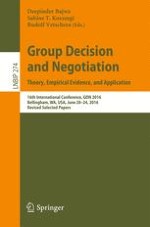2017 | OriginalPaper | Buchkapitel
Plurality, Borda Count, or Anti-plurality: Regress Convergence Phenomenon in the Procedural Choice
verfasst von : Takahiro Suzuki, Masahide Horita
Erschienen in: Group Decision and Negotiation. Theory, Empirical Evidence, and Application
Aktivieren Sie unsere intelligente Suche, um passende Fachinhalte oder Patente zu finden.
Wählen Sie Textabschnitte aus um mit Künstlicher Intelligenz passenden Patente zu finden. powered by
Markieren Sie Textabschnitte, um KI-gestützt weitere passende Inhalte zu finden. powered by
